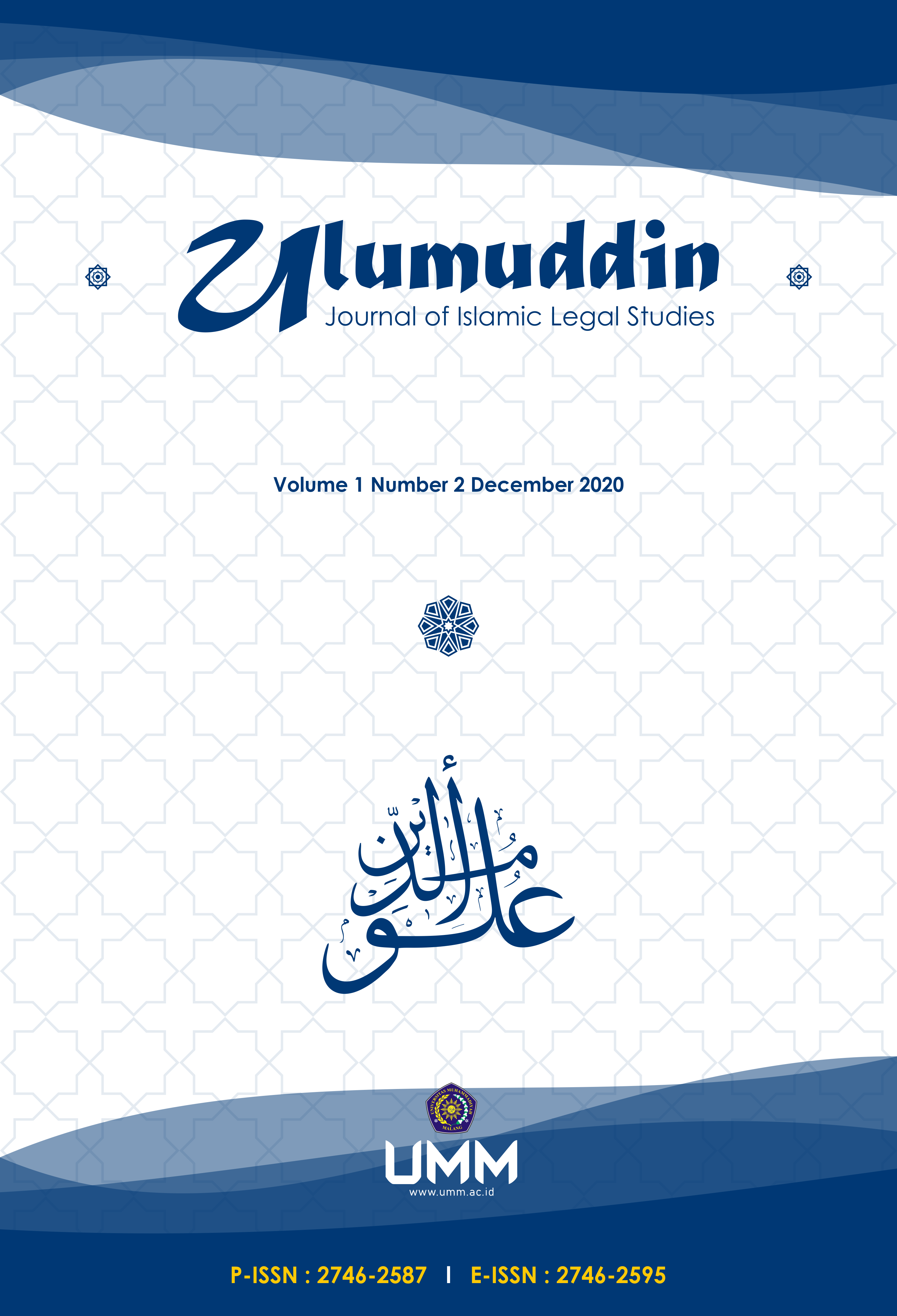An Islamic Legal hermeneutics on Nafāqah during the Covid-19 Pandemic
DOI:
https://doi.org/10.22219/ulumuddin.v1i2.13240Keywords:
Islamic Legal hermeneutics, Nafāqah, the Covid-19 Pandemic, earning a living, alimony, gender equality.Abstract
Those who work and earn money in the public sphere are obliged to find alimony and provide a living (nafāqah). The assumption that has been believed by the Muslim society is that alimony is a man's duty (husband to wife, father to family). This assumption has been influenced by several factors such as language construction, state policies and the normative religious understanding. During the Covid-19 pandemic, this one-sided assumption has not only continued discriminatory for women and kept them away from such fair and equal economic access, but also it has tended to take Muslim families’ economy into the risks. This article aims to examine the complexities of working women position in the Islamic legal jurisprudence and provide an alternative narrative of Islamic legal hermeneutics ensuring that the livelihoods do not become the domain of men alone. Accordingly, it can be argued that the alimony might be considered to become the obligation of both men and women equally. Interviews with a number of women at the grassroots level prove that women are being able to play roles in earning a living.Downloads
References
Abdurrahman, e. a. (2011). Al-Qur’an dan Isu-isu Kontemporer. Yogyakarta: eLSAQ Press. Abu Zayd, N. H. (1995).
Al-Mar’ah fi Khitāb al-Azmah. Kairo: The Legal Research and Resource center for Human Right,. al-Qarḍhāwī, Y. (1987).
Min Hadyil Islāmī Fatāwā Mu’āṣirah. Beirut: Dārul Ma’rifah. Al-Raysūnī, A. (2005).
Imām al-Shātibī’s Higher Objectives and Intents of Islamic Law. The International Institute of Islamic Thought, 112. al-Zuhailī, W. (2002).
Al-Fiqh al-Islāmī wa Adillatuhu (Vol. 10). Suriah: Dār al-Fikr. Badan Pengembangan dan Pembinaan Bahasa. (2020, September 8).
Kamus Besar Bahasa Indonesia: Kamus Versi Online. Retrieved September 8, 2020, from kbbi.web.id:
https://kbbi.web.id/nafkah. Bennett, L. R. (2012, September).
Infertility, Womanhood and Motherhood in Contemporary Indonesia: Understanding Gender Discrimination in the Realm of Biomedical Fertility Care. Journal of Intersections: Gender and Sexuality in Asia and the Pacific, 1(28), 1-12. Retrieved from https://reproductive-health-journal.biomedcentral.com/articles/10.1186/1742-4755-9-24 Cai , H. (2020, April).
Sex difference and smoking predisposition in patients with COVID-19. The Lancet, Respiratory Medicine, 8(4), e20. doi:10.1016/S2213-2600(20)30117-X Gausman , J., & Langer, A. (2020, April).
Sex and Gender Disparities in the COVID-19 Pandemic. Journal of Woman’s Health , 29(4), 465. doi:https://doi.org/10.1089/jwh.2020.8472
Ismāil al-Bukhari, A. b. (n.d). Al-Ṣahīh al-Bukhārī (Vol. 1). Beirut: Dār al-Fikr.
Ismāil al-Bukhari, A. b. (n.d). Al-Ṣahīh al-Bukhārī (Vol. 4). Beirut: Dār al-Fikr. Jarīr at-Ṭabarī, M. b. (n.d).
Tafsīr al-Ṭabarī Jāmi’ al-Bayān ‘an Ta’wīl Āyāt al-Qur’ān. Kairo: Maktabah Ibnu Taimiyyah.
Komisi Informasi dan Komunikasi MUI. (2017, Februari 22).
Pengiriman Tenaga Kerja Wanita (TKW) Ke Luar Negeri. Retrieved September 8, 2020, from mui.or.id: http://mui.or.id/wp-content/uploads/files/fatwa/27.-Pengiriman-Tenaga-Kerja-Wanita-TKW-Ke-Luar-Negeri.pdf LPMQ Kemenag. (2020, September 11).
Qur’an Kemenag. Retrieved September 11, 2020, from quran.kemenag.go.id: https://quran.kemenag.go.id/sura/4 LPMQ Kemenag. (2020, September 11).
Qur’an Kemenag. Retrieved September 11, 2020, from quran.kemenag.go.id: https://quran.kemenag.go.id/sura/2 Means, G. (1987).
Women’s Rights and Public Policy in Islam: Report of a Conference. Asia Survey, 27(3), 343. doi: https://doi.org/10.2307/2644808
Milkan , H., Sih , Wati , N., & Iswati , R. (2020, Juni 4).
Bagaimana perempuan di Sendangagung mencari nafkah semasa pandemi? (Y. Muthmainnah, & R. Z. Khaidir, Interviewers) Muslim, A. A.-H. (n.d). Al-Ṣahīh al-Muslim (Vol. 7). Riyādh: Dār al-Salām. Muslim, A. A.-H. (n.d).
Al-Ṣahīh al-Muslim (Vol. 4). Riyādh: Dār al-Salām. Muthahhari, M. (1998).
The Rights of Women In Islam. Teheran: World Organization for Islamic Service. Purnomo, K. (2020, April 24).
Menteri PPPA: 4.144 Pekerja Migran RI Dipulangkan, 83 Persennya Perempuan. Jakarta, DKI Jakarta, Indonesia. Retrieved April 24, 2020, from https://nasional.kompas.com/read/2020/04/24/08271741/menteri-pppa-4144-pekerja-migran-ri-dipulangkan-83-persennya-perempuan?page=all Putri, C. A. (2020, Juni 3).
Bulan Corona, 3 Juta Orang Kena PHK & Dirumahkan. Jakarta, DKI Jakarta, Indonesia. Retrieved from https://www.cnbcindonesia.com/news/20200603193109-4-162890/3-bulan-corona-3-juta-orang-kena-phk-dirumahkan Quṭb, S. (2004).
Tafsīr Fī Ẓilalil Qur’ān: di Bawah Naungan Al-Qur’an (Vol. 22). (A. Yasin, Trans.) Jakarta: Gema Insani Press. Ramli, R. P. (2020, April 7).
Dampak Virus Corona, 1226 Hotel di Indonesia Tutup. Jakarta, DKI Jakarta, Indonesia. Retrieved April 7, 2020, from https://money.kompas.com/read/2020/04/07/120414826/dampak-virus-corona-1226-hotel-di-indonesia-tutup Sakai, M., & Fauzia, A. (2016, Februari).
Performing Muslim Womanhood: Muslim Business Women Moderating Islamic Practices in Contemporary Indonesia. Journal of Islam and Christian–Muslim Relations, 27(3), 236-237. doi:10.1080/09596410.2015.1114243
Shihab, M. Q. (1996). Membumikan al-Qur’an: Fungsi dan Peran Wahyu dalam Kehidupan Masyarakat. Bandung: Mizan. Sinombor, S. H. (2020, Maret 28).
Terimbas Covid-19, Perempuan Pekerja Informal Mulai Menjerit. Jakarta, DKI Jakarta, Indonesia. Retrieved Maret 28, 2020, from https://kompas.id/baca/humaniora/dikbud/2020/03/28/terimbas-covid-19-perempuan-pekerja-informal-mulai-menjerit/ UN Women Asia and Pasific. (2020).
The Impact of Covid-19 on Women. New York: UN Women. Retrieved from https://asiapacific.unwomen.org/en/digital-library/publications/2020/04/policy-brief-the-impact-of-covid-19-on-women. United Nations Population Fund. (2020).
Covid-19: A Gender Lens, Protecting Sexual and Reproductive Health abd Rights, and Promoting Gender Equality. New York: UNFPA. Retrieved from https://www.unfpa.org/sites/default/files/resource-pdf/COVID-19_A_Gender_Lens_Guidance_Note.pdf. Wulandari , R. D., Putri, N. K., & Laksono , A. D. (2020).
The Gender Disparities in the Psychosocial Burden of COVID-19 in East Java Province, Indonesia. International Journal of Innovation, Creativity and Change, 498-514. Retrieved from https://www.ijicc.net/images/Vol_14/Iss_2/14234_Wulandari_2020_E_R.pdf.
Downloads
Published
How to Cite
Issue
Section
License
Copyright (c) 2020 Ulumuddin

This work is licensed under a Creative Commons Attribution-ShareAlike 4.0 International License.



















